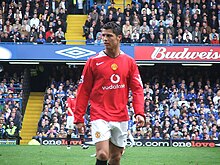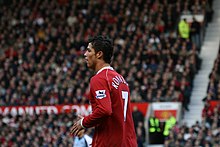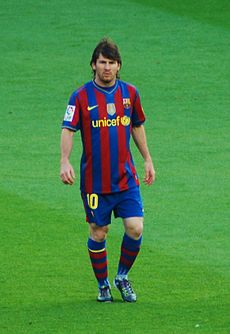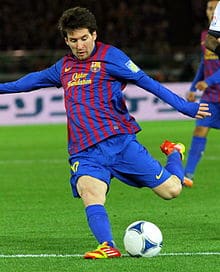2003–06: Development and breakthrough
Ronaldo became Manchester United's first-ever Portuguese player when he signed before the
2003–04 season.
[28] His transfer fee of £12.24 million made him, at the time, the most expensive teenager in English football history.
[29] Although he requested the number 28, his number at Sporting, he received the number 7 shirt, which had previously been worn by such United players as
George Best,
Eric Cantona and
David Beckham.
[30][31] Wearing the number 7 became an extra source of motivation for Ronaldo.
[31] A key element in his development during his time in England proved to be his manager, Alex Ferguson, of whom he later said, "He's been my father in sport, one of the most important and influential factors in my career."
[32]
"There have been a few players described as 'the new George Best' over the years, but this is the first time it's been a compliment to me."
—Former Manchester United player George Best on the 18-year-old Ronaldo in 2003[33]
Ronaldo made his debut in the
Premier League in a 4–0 home victory over
Bolton Wanderers on 16 August 2003, receiving a standing ovation when he came on as a 60th-minute substitute for
Nicky Butt.
[34][35][36] His performance earned praise from George Best, who hailed it as "undoubtedly the most exciting debut" he had ever seen.
[33]Ronaldo scored his first goal for Manchester United with a free-kick in a 3–0 win over
Portsmouth on 1 November.
[37] Three other league goals followed in the second half of the campaign,
[38][39] the last of which came against
Aston Villa on the final day of the season, a match in which he also received his first
red card.
[40] Ronaldo ended his first season in English football by scoring the opening goal in United's 3–0 victory over
Millwall in the
FA Cup final, earning his first trophy.
[41]

Ronaldo playing against
Chelsea in the Premier League during his third season in England
At the start of 2005, Ronaldo played two of his best matches of the
2004–05 season, producing a goal and an assist against Aston Villa and scoring twice against
rivals Arsenal.
[42][43][44][45] After scoring four goals in United's run to the
FA Cup final,
[46][47][48][49] he played the full 120 minutes of the decisive match against Arsenal, which ended in a goalless draw, and scored his attempt in the lost
penalty shootout.
[50] Ronaldo scored three braces during the next campaign, the
2005–06 season, scoring two goals each against Bolton Wanderers,
[51] Fulham,
[52] and Portsmouth.
[53] He scored Manchester United's 1000th Premier League goal on 29 October, their only strike in a 4–1 loss to
Middlesbrough.
[54] Midway through the season, in November, he signed a new contract which extended his previous deal by two years to 2010.
[55] Ronaldo won his second trophy in English football, the
Football League Cup, after scoring the third goal in United's 4–0 final victory over
Wigan Athletic.
[56]
During his third season in England, Ronaldo was involved in several incidents. He had a one-match ban imposed on him by
UEFA for a "
one-fingered gesture" towards
Benfica fans,
[57] and was sent off in the
Manchester derby—a 3–1 defeat—for kicking
Manchester City's former United player
Andy Cole.
[58] Ronaldo clashed with a teammate, striker
Ruud van Nistelrooy, who took offence at the winger's showboating style of play.
[59] Following a training ground fight in January 2006, the two again fought in May, with Van Nistelrooy telling Ronaldo to "go crying to your daddy", a reference to Ronaldo's relationship with assistant manager
Carlos Queiroz.
[60] Van Nistelrooy was left on the substitutes' bench for the final game of the season against
Charlton Athletic—a 4–0 victory in which Ronaldo scored his ninth league goal.
[61][62] Following the
2006 FIFA World Cup, in which he was involved in an incident where club teammate
Wayne Rooney was sent off,
[63][64] Ronaldo publicly asked for a transfer, lamenting the lack of support he felt he had received from the club over the incident.
[65][66] United, however, denied the possibility of him leaving the club.
[67][68]
Although his World Cup altercation with Rooney resulted in Ronaldo being booed throughout the
2006–07 season,
[69] it proved to be his breakout year, as he broke the 20-goal barrier for the first time and won his first
Premier League title. An important factor in this success was his one-to-one training by first-team coach
René Meulensteen, who taught him to make himself more unpredictable, improve his teamwork, call for the ball, and capitalise on goalscoring opportunities rather than waiting for the chance to score the aesthetically pleasing goals for which he was already known.
[70] His upturn in form was showcased in November when he received a standing ovation from a section of
Blackburn Rovers supporters as he was substituted.
[71] He scored three consecutive braces at the end of December, against Aston Villa—a victory which put United on top of the league—Wigan Athletic, and
Reading.
[72][73][74] Ronaldo was named the
Premier League Player of the Month in November and December, becoming only the third player to receive consecutive honours.
[75][76]
2007–09: Collective and individual success

Ronaldo during the 2006–07 season
At the quarter-final stage of the
2006–07 UEFA Champions League, Ronaldo scored his first-ever goals in the competition, finding the net twice in a 7–1 victory over
Roma.
[77][78] He subsequently scored four minutes into the first semi-final leg against
Milan, which ended in a 3–2 win,
[79] but was
marked out of the second leg as United lost 3–0 at the
San Siro.
[80] He also helped United reach the
FA Cup final, putting them 2–1 up against
Watford,
[81] but the decisive match against
Chelsea ended in a 1–0 defeat.
[82] Ronaldo scored the only goal in the Manchester derby on 5 May 2007—his 50th goal for the club—as Manchester United claimed their first Premier League title in four years.
[83] As a result of his performances, he amassed a host of personal awards for the season. He won the
Professional Footballers' Association's
Player's Player,
Fans' Player, and
Young Player of the Year awards, as well as the
Football Writers' Association's
Footballer of the Year award,
[84][85] becoming the first player to win all four main PFA and FWA honours.
[86] His club wages were concurrently upgraded to £120,000 a week (£31 million total) as part of a five-year contract extension with United.
[87]
Ronaldo scored a total of 42 goals in all competitions during the
2007–08 season, his most prolific campaign during his time in England. His first goal of the season came against his former club, Sporting, with a header in the first group match of the Champions League.
[88] He missed three matches after headbutting a
Portsmouth player at the start of the season, an experience he said taught him not to let opponents provoke him,
[89][90] but still managed to score 13 league goals by the campaign's midway point.
[91][92][93][94] At the end of 2007, Ronaldo was named runner-up to
Kaká for the
Ballon d'Or,
[95] and came third, behind Kaká and
Lionel Messi, in the running for the
FIFA World Player of the Year award.
[96]
"Ronaldo is better than George Best and
Denis Law, who were two brilliant and great players in the history of United."
Ronaldo scored his first and only
hat-trick for Manchester United in a 6–0 win against
Newcastle United on 12 January 2008, bringing United up to the top of the Premier League table.
[98] A month later, on 19 March, he captained United for the first time in a home win over Bolton, and scored both goals of the match.
[99] His second goal was his 33rd of the campaign, which bettered George Best's total of 32 goals in the 1967–68 season, thus setting the club's new single-season record by a midfielder.
[100] Ronaldo scored his final league goal of the season from the penalty spot in the title decider against Wigan on 11 May, as United claimed a second successive Premier League title.
[101] His 31 league goals earned him the
Premier League Golden Boot,
[102] as well as the
European Golden Shoe, which made him the first winger to win the latter award.
[103]
In the knockout stage of the Champions League, Ronaldo scored the decisive goal against
Lyon, which helped United advance to the quarter-finals 2–1 on aggregate,
[104] and, while playing as a striker, scored with a header in the 3–0 aggregate victory over Roma.
[105] Despite him missing a penalty in the first leg against Barcelona,
[106] United eventually advanced to the
final in Moscow, where they faced Chelsea.
[107] His opening goal was negated by an equaliser as the match ended in a 1–1 draw, but although his penalty was saved in the shoot-out,
[108] Manchester United emerged victorious.
[109][110] As the
Champions League top scorer, Ronaldo was named the
UEFA Club Footballer of the Year.
[111] He additionally received the PFA Players' Player of the Year and FWA Footballer of the Year awards for the second consecutive season.
[112][113]
As rumours circulated of Ronaldo's interest in moving to
Real Madrid,
[114][115] United filed a tampering complaint with governing body FIFA over Madrid's alleged pursuit of their player, but they declined to take action.
[116][117] FIFA president
Sepp Blatter asserted that the player should be allowed to leave his club, describing the situation as "modern slavery".
[118] Despite Ronaldo publicly agreeing with Blatter,
[119][120] he remained at United for another year.
[121][122][123] Ahead of the
2008–09 season, on 7 July, he underwent ankle surgery,
[124] which kept him out of action for 10 weeks.
[125] Following his return, he scored his 100th goal in all competitions for United with the first of two free kicks in a 5–0 win against
Stoke City on 15 November,
[126] which meant he had now scored against all 19 opposition teams in the Premier League at the time.
[127] Five days later, he received the third red card of his career when he was sent off against Manchester City.
[128] At the close of 2008, Ronaldo helped United win the
FIFA Club World Cup in Japan,
[129] assisting the
final-winning goal against
Liga de Quito and winning the
Silver Ball in the process.
[130][131] He subsequently became United's first
Ballon d'Or winner since George Best in 1968,
[132][133] and the first Premier League player to be named the
FIFA World Player of the Year.
[134]
Ronaldo scored his first Champions League goal of the season, and his first since the final against Chelsea, in a 2–0 victory over
Inter Milan, sending United into the quarter-finals.
[135] His match-winning goal in the second leg against
Porto, a 40-yard strike, earned him the inaugural
FIFA Puskás Award, presented by FIFA in recognition of the best goal of the year;
[136] he later called it the best goal he had ever scored.
[137][138] He scored twice against Arsenal, including a free kick from 39 yards, as United advanced to the
final in Rome,
[139] where he made little impact in United's 2–0 defeat to Barcelona.
[140][141] Ronaldo ended his time in England with nine trophies, as United claimed their third successive Premier League title and a
Football League Cup.
[142][143] He finished the campaign with 26 goals in all competitions, 16 goals fewer than the previous season, in four more appearances.
[144] His final ever goal for Manchester United came on 10 May 2009 with a free kick in the Manchester derby at
Old Trafford.
[145]

 Lionel Messi was born, 24 June 1987, in Rosario, Argentina to a working-class family. His father was a factory steel worker, and his mother a cleaner.
Lionel Messi was born, 24 June 1987, in Rosario, Argentina to a working-class family. His father was a factory steel worker, and his mother a cleaner. Messi progressed through the ranks and was given his first appearance in the 2004/05 season becoming the youngest player to score a league goal. In 2006, Messi was part of the double winning team which won both La Liga (Spanish League) and Champions League. By next season, (2006-07) aged just 20, Messi was the first choice striker and an essential part of the Barcelona team – scoring 14 goals in 26 league games.
Messi progressed through the ranks and was given his first appearance in the 2004/05 season becoming the youngest player to score a league goal. In 2006, Messi was part of the double winning team which won both La Liga (Spanish League) and Champions League. By next season, (2006-07) aged just 20, Messi was the first choice striker and an essential part of the Barcelona team – scoring 14 goals in 26 league games.